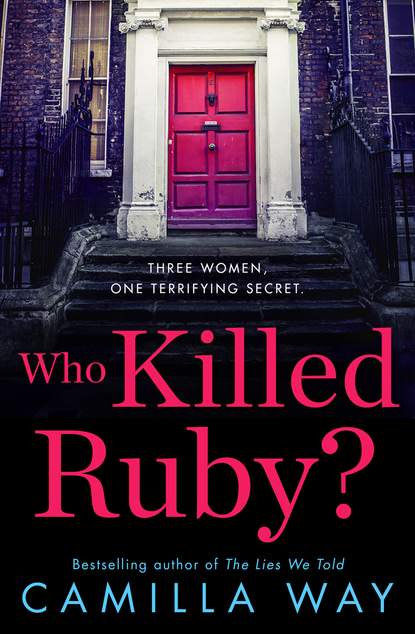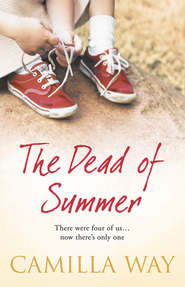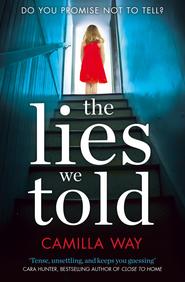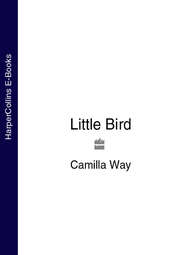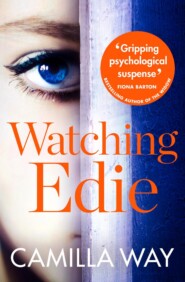По всем вопросам обращайтесь на: info@litportal.ru
(©) 2003-2025.
✖
Who Killed Ruby?
Автор
Год написания книги
2019
Настройки чтения
Размер шрифта
Высота строк
Поля
They pass beneath a street lamp just as Cleo looks up at her and smiles, and there is, again, something in the angle of her face, in the expression in her eyes, that takes Viv’s breath away. Her daughter looks in that split-second so exactly like Ruby that her sister is brought back to life with sudden, shocking force.
It’s a new thing, Cleo’s random expressions triggering this heart-jolting reaction in her. Out of the blue a memory will turn up, glinting and sharp, to stop Viv in her tracks. Tonight she’s transported back to the little house in Essex where she and Ruby spent their childhood, a white, ramshackle cottage on the edge of a stretch of fields. In this memory Ruby is sixteen and heavily pregnant, dressed in a blue cotton dress and standing by the window that’s crisscrossed with iron latticing, the light falling on her red-gold hair, her hand resting on her swollen belly.
Viv, aged eight, had gone to her sister and pressed her cheek upon her tummy, gazing up at her as she listened intently. And then it happened: as Ruby smiled down at her with the exact same expression that she’ll see mirrored in her own daughter’s face thirty-two years later, Vivienne felt something move beneath her cheek and squealed in excitement. ‘Did you feel that?’ she asked. ‘I felt him! I felt the baby kick!’
And Ruby grinned and said, ‘Yes, I felt it too. Not long to go, Vivi. Two weeks and you’ll be an auntie.’ An auntie at eight years old! How important and grown-up and wonderful that felt. She would love this baby with all her heart; she did already.
But she never got to meet her sister’s child, never had a chance to call him by the name Ruby had so carefully chosen. Noah. Her nephew would have been called Noah. Because almost two weeks later, a few days before her due date, Ruby would be dead, and Noah with her.
Now, walking along the dark street with her own child, a passing motorbike rouses her from her thoughts. Seeing that they’ve nearly reached their gate she swallows back the shards of pain that have risen to her throat. ‘Come on,’ she says to Cleo, opening the door. ‘Go and get changed and I’ll make dinner, then we’ll watch something on Netflix, shall we?’
Alone in the kitchen, she puts the radio on and pours herself a glass of wine. She hates it when this mood descends upon her. It’s the anniversary of Ruby’s death on Monday and it always upsets her, no matter how prepared for it she is. Noah would have turned thirty-two this year, and as she has done every single year since it happened, she imagines the person he might have become – from toddler, to schoolboy, to teenager and young man – a sadness gathering inside her that’s hard to shake off. ‘Come on, Viv, get a grip,’ she tells herself and, tuning the radio to a music station, she turns the volume up, then starts to put together the ingredients for spaghetti bolognese.
3 (#ulink_865c9e48-3477-5337-9e9e-fb4d1c2afaf4)
There’s so much of that day that she doesn’t remember. She knows that she was the only other person in the house when Ruby was killed. That it was she who found her sister’s body, hugely pregnant, splayed out across her bedroom floor. She knows that it was her evidence that helped put Ruby’s murderer away. But though Viv knows what she said she saw, she cannot link those words to any clear, concrete images, as though the details are locked inside a box she has no access to. She’s been told that this is common; the mind’s way of protecting her from the trauma of that day, but still those buried memories won’t let her be, tapping and scratching at the box’s lid, as though willing her to relent and let them back out.
Even the time before the murder is hazy, her life in that little white cottage only returning to her in flashes. They were very poor, she remembers that. Viv and Ruby, eight years between them, each had different fathers; men who were bad and made their mother sad and who they learned never to ask about because they were gone and that was all. The house was down a narrow lane with four other cottages. She sees the patio tiles outside it, dandelions poking through the cracks, an old, abandoned swing set on the patchy lawn, the fields stretching out beyond. Inside, the rooms were sparsely furnished, the panes loose in the casement windows, the wind whistling through the gaps. In her bedroom under the eaves a pattern of pink and red roses crept across the walls. Her sister’s identical one was across a narrow corridor, a quilt on the bed of orange and turquoise and green.
And what does she remember of Ruby, before it happened? She knows that she loved her sister more than anyone or anything, that Ruby would take Viv into her bed to comfort her at night when she was sad or frightened. She remembers Ruby’s collection of china pigs lined up on her dressing table, the posters of handsome pop stars on her walls, the sweet floral perfume she used to wear, how she’d throw her head back and laugh wholeheartedly, her green eyes dancing. All those things he took from her; all her spirit and love and smell and warmth and kindness, Jack Delaney took them all.
Everything changed when Jack came into their lives. Overnight, Ruby seemed to become someone else; someone else’s. From the moment she met him her sister glowed, her eyes dreamy and lit with something Viv couldn’t guess at, her thoughts seemingly always filled with him. Ruby would wait for Jack at the window, ignoring Viv, staring eagerly down the lane for his car to appear, or else sit next to the phone, willing it to ring. Ruby told her that they’d met at the pub where she worked on Saturdays collecting and washing glasses. Jack had been sitting at the bar with the three other Delaney brothers, and Viv would picture him with his cigarette and his black hair and his thin-lipped smile and his stupid car parked outside, and feel a hard knot of dislike grow ever tighter in her belly.
Until then Vivienne’s experience of men had been confined to the ghostly, forbidden spectres of her and Ruby’s unmentionable fathers, her teacher Mr Kendal, or the kindly dads of her friends, or even Morris Dryden, the butcher’s grown-up son whom everyone said was soft in the head but whom Viv liked best of all. But Jack was different. Even at eighteen he oozed a complicated, threatening thing that was linked somehow to that new light in Ruby’s eyes, and the time Viv caught them kissing, Jack’s hands up her jumper as though rummaging for change. Slowly, however, Ruby began to alter, her usual glow and happiness seeming to ebb away until bit by bit it had disappeared completely.
Their mother hated Jack, she remembers that too; how she’d hear her and Ruby argue, Stella saying he was a thief and a troublemaker and that everyone in the village knew what he was like, what he and his brothers got up to, fighting and stealing and causing trouble. And Viv would think that her mother didn’t know the half of it, that when she went out to work Jack’s oily smile and fake politeness vanished and the real him would appear, like worms slithering from under rocks. She would see how he would change, a black mood creeping over him like the sun had gone in, how Ruby’s voice would turn pleading and tearful at his meanness and his temper. He was always cross with her about something: about how she’d looked at one of his friends or spoken in a way he didn’t like. And yet Ruby loved him, wanted to make him happy, her voice appeasing, cajoling, desperate to the end.
When Ruby got pregnant their mum said Jack Delaney was never to set foot in her house again, but as soon as Stella went off to the care home she worked at, there he’d be, Vivienne sworn to secrecy. He seemed to get worse, the bigger Ruby’s belly got. Viv would sit in the living room in front of the black-and-white TV and listen to their arguing; his rough, bullying voice, her sister’s tearful apologies, and her little hands would ball into fists, willing it to stop.
And what does she remember of that day, the day of Ruby’s murder? She remembers her sister waiting for Jack upstairs at her bedroom window as usual, running down to answer his knock and calling, ‘Don’t tell Mum, Vivi, OK? Don’t tell Mum that Jack was here.’ How she’d heard the disappointment in Ruby’s voice when she discovered it was only sweet, daft Morris Dryden, come to drop off some chops for their mum. A few minutes later, after Morris had left, she heard the second knock at the door, Jack’s voice this time, Ruby’s high, anxious one after she’d returned downstairs to let him in.
Viv had stayed in the living room, keeping out of his way, but still she heard when they’d begun to argue, heard Ruby’s desperate tears, Jack’s relentless, mocking cruelty. That day there’d been something different about their fight though, something terrible and out of control that made Viv’s heart hammer, made her chew her lip until it nearly bled. And then a scream, a heavy thud, followed by the worst, deepest silence she’d ever known. She’d waited, scarcely breathing, until she heard his tread on the stairs then the front door swinging shut behind him and as soon as she’d dared, she’d crept from the room and tiptoed up to Ruby’s. She’d known she was dead, felt it deep inside of herself, a scream of horror trapped in her throat as she stood at the door, gazing down at her sister’s lifeless body, her poor, bleeding head where she’d hit it as she fell, her green, sightless eyes.
It was the police who found Vivienne eventually; navy blue arms plucking her from the safe darkness of Stella’s wardrobe where she’d gone to hide, clothes brushing against her cheek as she was pulled into the cold brightness where the rooms were full of police and the air full of her mother’s sobs at what she’d found when she’d returned home from work.
Later, Vivienne would be told that she’d said nothing when they found her, that she’d continued to say nothing except for the one word she repeated over and over: ‘Jack.’
Over the following days and weeks, a kind and patient lady with thick round glasses, a turquoise jumper and a gentle voice had, while Stella held her hand, coaxed from her the evidence they’d needed to put Jack Delaney away for good. She’d told how she’d heard him in the house that morning, had heard him shouting at her sister, then Ruby’s terrible cry, the thump as her body hit the floor. Of course Jack had killed Ruby; who else could it have been? There was Morris Dryden’s account too; the butcher’s son telling how he’d passed Jack in the lane after he’d dropped off his delivery. And Declan Fairbanks, their neighbour, who’d seen Jack running from the house ten minutes later, and all the other locals who’d witnessed his bullying behaviour towards his pregnant girlfriend in the months leading up to her death.
Jack Delaney was responsible. There could be no mistake.
After the trial, Stella would sit immobile at the kitchen table for hour after hour, week after week, steeped in grief. It seemed to Vivienne as though all the darkness in Jack had poured into her mother: when Viv looked into her eyes she saw the same dull fury that had once burned in his.
The letters began to arrive soon after. Folded pieces of paper deposited like petrol bombs through the letter box during the night. At first she would bring them to Stella, who would turn away without looking at them, so Vivienne would go to Ruby’s room, where the row of china pigs still stood on the dressing table, where the handsome pop stars still grinned their 100-watt smiles, and she would sit on the bed and wrap the orange and turquoise quilt around herself and begin to read.
They were all from the Delaney family, from Jack’s mother or uncle or brothers. Those from his mother were pleading, desperate. You’ve made a mistake. Please please tell the truth. He’s only 18. He never did it. You know he never did it. He’d never kill no one, please, please make them see. But the ones from his brothers and his uncles were angry, threatening; written in thick black capitals that all but tore through the page: Your daughter’s a lying little bitch. Make her tell the truth. And, You and your brat are fucking liars. Watch your back. She would read them with terror rising inside her. At night she’d lie in her bed and tremble, listening for the letter box to rattle. But Viv hadn’t lied. She had heard him that day. She had told the police she did, so it must have been true.
In a matter of months, the life Viv had always known would be gone forever, though she didn’t know then the changes that were to come. Meanwhile, neighbours and kindly villagers helped take care of her. They looked at her with misty-eyed pity, picking her up from the village primary and taking her home with their own kids; to warm, busy, noisy houses with Danger Mouse on the telly and fish fingers in the oven. Your mum just needs a bit of time, they’d say. She’ll be all right, you’ll see. Later, Viv would be taken back home, to where the temperature seemed to drop twenty degrees and the silence pressed against the walls, to where Stella hadn’t seemed to move from her position at the kitchen table in weeks.
Stella never went back to her job at the care home. The letters from the letting agency piled up on the doormat amongst brown ones with ‘Final Demand’ stamped upon them. When bailiffs pounded on their door Stella behaved as though she couldn’t hear them and Viv was too afraid to let them in herself. Similarly, she learned not to pick up the phone when, relentlessly, it rang, and neither of them noticed when the line was finally cut off.
Only one day stands out from the grinding darkness of those weeks. On an April morning five months after Ruby’s death, Vivienne came downstairs in her uniform ready for school to find a surprising sight. Her mother, up and dressed and ready to go out. ‘Put your coat on, Vivienne,’ she said without looking at her.
Viv hadn’t moved. ‘Where are we going?’
The reply had been astonishing. ‘To see your grandparents,’ Stella had said.
The journey had been a long one, taken first by train then coach to a faraway rain-drenched city and followed by another journey by bus to a small village. She could tell by the look in her mother’s eye that it wasn’t the time for questions, so she’d sat quietly next to her, holding her hand, trying not to worry. She’d never met her grandparents before and she wondered what they might be like. Her mother had only ever told her that they lived far away, and that she hadn’t seen them for a long time, and something had made Viv know not to push for more.
When they’d arrived, the house had been very large and beautiful, surrounded by rolling countryside. Vivienne, told to wait at the gate, had watched as her mother traipsed up the long drive, approached the door and knocked. A grey-haired man had answered, and Viv never knew what was spoken between them, only that minutes later the door had slammed shut, Stella had returned to where she waited and said in a voice as heavy as stones, ‘Get up, Vivienne. There’s nothing for us here.’
They’d made the return journey mostly in silence, her mother lost in thought and unreachable. It was late when they got back to their cottage and for some time they had stood staring at the front door, the moonlight revealing what was painted there in vicious foot-high letters: LIARS.
4 (#ulink_1eb76ab3-2916-574c-b839-b72616f872d3)
It was a few weeks after that when Vivienne’s life in Essex came to an abrupt end. Viv had returned home from school one day to find Stella packing their one and only suitcase. ‘We’re moving to London,’ she’d said as Viv watched her, wide-eyed. ‘Take that uniform off and throw it in the bin.’ Then she’d tossed her Ruby’s little green rucksack. ‘Put whatever you can fit in there, the rest we’ll leave. Let that pig of a landlord deal with it.’
They left there and then, taking a bus to the nearest station to catch a train to a new life. She had sat across from her mother, her bag of belongings on her lap, and tried to make sense of it all. Were they leaving because of Jack’s family? Or because they had no money left to pay the rent? She had sneaked a glance at her mum, and thought she understood: Ruby’s death was too sad, too terrible, to do anything else but run from.
For the first few months of their new London life they’d moved from place to place, to the spare beds or sofas belonging to ‘friends of friends’, or the sister of someone Stella used to work with. Sometimes Viv thought about the toys and bedroom she’d left behind, she thought of her friends and the people she knew in their village, but then she remembered the cold dragging misery of Ruby’s funeral, the cross bearing her and Noah’s names, the mound of earth covered in irises, her sister’s favourite flower, and she knew she never wanted to go back there again.
Stella never said how she found the commune in Nunhead and Vivienne didn’t ask, it was just another surprising turn in this constantly twisting new life of theirs. It was 1985, Nunhead a grubby pocket of south-east London tucked between New Cross and Peckham. The occasional small and dusty pub filled with small and dusty old men; clusters of council estates, Afro-Caribbean barber shops that stayed open half the night, lights and music and laughter spilling out across the pavement, narrow streets of dirty-bricked terraces, punctuated here and there by a greasy spoon, a bookies, a launderette. It was as far away from their rural Essex lives as Mexico or the moon.
Unity House had been on the border of New Cross, along a wide street lined with tall Victorian houses with steep steps to the door, from where you could look down at the barred windows of the cool dark basement area far below. Viv and her mother had arrived there one rainy Tuesday afternoon. They’d stood staring up at its yellow front door, they and their bags growing steadily damper in the drizzle.
Suddenly the door had opened and a young, pretty woman with a mass of black curls tied back with a red bandana and huge silver hoops in her ears had said, ‘Hello! You must be the new recruits. I’m Jo. Looks like you could do with a cuppa.’ And Viv had looked into Jo’s smiling face and something tightly bound inside her had unloosened a fraction for the first time since they’d left Essex and she’d thought, Thank you, oh thank you, thank you.
Unity House had been the start of it all, the start of their new life, of Stella’s transformation, though they hadn’t known that then. Jo had led them to an enormous kitchen with lime green walls and a long table covered in books and mugs and gardening gloves, a tomato plant someone was in the middle of repotting. Off the kitchen was a brick outhouse, and spying a wooden hutch, Vivienne had let go of her mother’s hand and dropped to her knees to find the biggest rabbit she’d ever seen.
When she returned she’d stared up wide-eyed at the posters pinned to the kitchen walls. One, bizarrely, was of a fish riding a bicycle, another was about something called Greenham Peace Camp. After a while she’d tuned into her mum and Jo’s conversation and was shocked to hear Stella haltingly tell her about Ruby. Viv had held her breath; her mother never talked about these things, not ever, not even to her. But Jo had leaned forward and put her hand on Stella’s arm, her eyes shining with compassion. ‘You’ve come to the right place,’ she said. ‘We’re all survivors here, one way or another.’
When they’d finished their tea, Jo had shown them around their new home, which they soon saw was much bigger than it had appeared from the street: four floors of large, light and airy rooms, linked by narrow passageways and three steep flights of stairs. In the living room one wall was entirely covered by a mural of a naked woman, a white dove in each hand. Everywhere she looked were piles of books, an abundance of pot plants, large, dramatic abstract oil paintings in vivid primary colours, a broken guitar here, somebody’s bike there. Indian throws were pinned across the large bay windows, turning the room’s light a pale mauve, orange, green. Viv can still recall the house’s singular woody, musty smell, feel the fresh air blowing through the always-open garden door.
One by one they were introduced to the others. There was Sandra and Christine, who, strangely, had a son together, a round-faced two-year-old named Rafferty Wolf who called one of them Mummy and the other Mama; they lived on the first floor. Soren, a slender, bright-eyed woman in her sixties, wore her grey hair in a long plait to her waist and was clearly responsible for the artwork displayed throughout the house; her attic space was lined with dozens of canvases, a smell of turps in the air.
On the second floor lived Hayley. A student in her twenties, she had purple spiky hair, a nose ring and a wide smile that showed large and gappy teeth. Her room was thick with cigarette smoke and through its fug Viv saw that her walls were covered in posters and flyers with slogans like ‘Maggie Out!’ and ‘Ban the Bomb!’ and ‘Fuck Capitalism!’ Across the hall was Jo’s room. In the basement lived Kay, who had a man’s haircut, shy brown eyes, wore a man’s suit, and barely spoke. ‘You’ll meet Margo later,’ Jo had promised as she showed them to the room that would be theirs.
That evening a dinner was thrown in their honour. The long table now cleared of gardening things, the nine of them crowded around it, everyone – apart from Viv, her mother and Kay – talking at once while Jo ladled something called goulash onto their plates. Vivienne sat close to her mother, overwhelmed by the hubbub of voices, the good-natured jostling for space, and she’d watched wide-eyed as Sandra, mid conversation, lifted her top to reveal her bare breast for Rafferty Wolf to feed hungrily from.
And then Margo had entered the room. Though in her fifties, her black skin was still luminous, her long dreadlocks only lightly peppered with grey. She was, Viv thought, absolutely beautiful. Her movements slow and languorous, she wore a long billowy blue dress with mustard embroidery at the bodice. She took her seat at the head of the table and while Jo poured her a drink, she had turned her large dark eyes to Viv and her mother. ‘Welcome, Vivienne and Stella, I’m so pleased to have you here,’ she’d said.
Candles flickered and spilled red wax down the necks of wine bottles, their flames casting shadows of the women against the lime green walls. Margo told them how she’d started the commune ‘as a place of shelter, somewhere we can live without violence or fear or censure. Everyone is equal here. We all contribute, we pool our resources, our time and our skills …’ She had a slow, sonorous way of talking that was almost hypnotic. Somebody put some music on, a female voice rising and falling along with a flute and a guitar. Vivienne, sleepy now, leaned her head against her mother’s shoulder as she listened to Margo talk.
One by one, the women had told their stories that night, describing how they’d come to find each other, how Margo and Unity House had changed their lives. Viv must have fallen asleep, because the next thing she knew she was being carried up to bed, a blanket pulled over her, her ears full of the music and the rise and fall of the women’s voices.
They would stay at Unity House for almost a decade, and during that time the strong, clever, loving women who lived there would each, in their own way, help to shape the person Vivienne would become. But, just as that first night it was Margo who’d made the greatest impression upon eight-year-old Viv, it would also prove to be Margo who taught her the most valuable lesson of all – that people aren’t necessarily always who they seem.
5 (#ulink_55b361b3-7fbc-5ae6-945b-b7b4fb570c7e)





